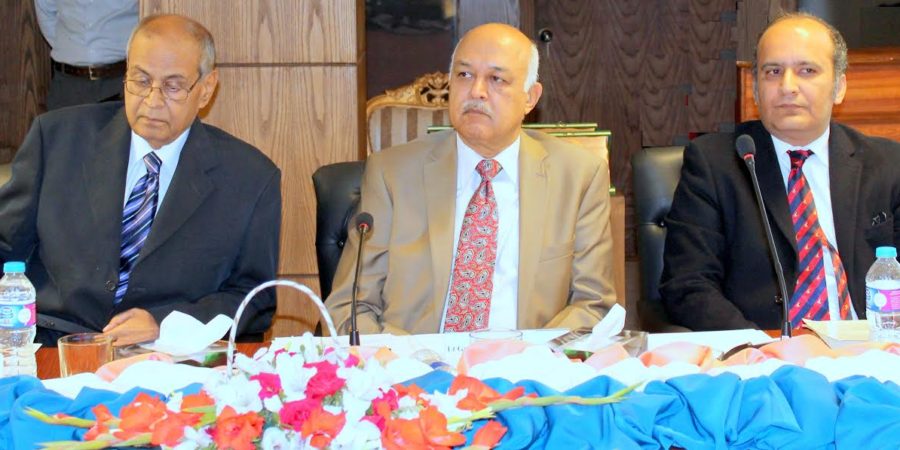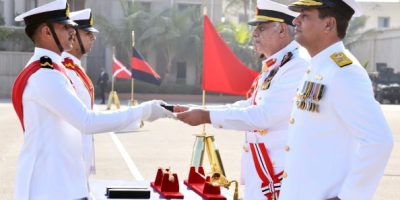Roundtable on “Regional Implications of Indian Hegemony in SAARC”

MAR 08, (DNA) – India’s power politics have not allowed the South Asian Association of Regional Countries (SAARC) to focus on the socio-economic development of the region. By politicising SAARC as an organisation and making sub-regional groupings, India is trying to make SAARC ineffective and to isolate Pakistan.
However, Pakistan needs to put its own house in order so that it can seriously and effectively resist India’s regional hegemonic designs. China’s membership of SAARC has the potential to revive and re- orient this entity towards its original vision. This was the unanimous view of the experts at the one-day roundtable on “Regional Implications of Indian Hegemony in SAARC” organised by the IslamabadPolicy Research Institute.
Welcoming the panellists and providing an overview of the roundtable, President IPRI Ambassador (R) Sohail Amin said that Pakistan has done its utmost to resolve its disputes with India peacefully, and is ready to hold dialogue with it. “But it is India which negates dialogue based on various petty reasons and is lingering on the Kashmir dispute to maintain the status quo”, he emphasised. By sabotaging the 19 the SAARC Summit that was to be held in Pakistan in November 2016, India has violated the spirit andeobjectives of SAARC, he added.
“India is a status inconsistent state,” according to Dr Muhammad Mujeeb Afzal, Assistant Professor at Quaid-i- Azam University, because in South Asia, it is perceived as a regional hegemon, while globally it wants to present a docile strategic posture through its soft diplomacy. At the international level, India is pushing its non-violence and neutrality punch sheet, while at the regional level, it is the polar opposite,
using coercion and intervention over its smaller neighbors. Dr Mujeeb was presenting his paper on the “Dynamics of Indian Hegemony in the SAARC Region”. India has managed to develop concert with the West, providing added impetus to its aspirations for acquiring global status, but without Pakistan, it cannot reach those aspirations, he opined. He highlighted that SAARC as a regional institution has
become a victim of competing apprehensions as well as Indian hegemony. But this hegemony has primarily failed since India’s efforts to keep third parties, such as China outside the South Asian realm have failed.
Ambassador (R) Fauzia Nasreen, Head, Centre for Policy Studies, COMSATS, Islamabad discussed the
“Politico-Economic and Security Implications of Indian Hegemony in the SAARC Region.” She was of
the view that the SAARC region’s strategic significance has increased considerably since India’s attempts
to determine the South Asian order have been frustrated due to resistance from nationalist forces within
the member countries. “Deep Indian involvement in domestic situations is paradoxical. On the one hand,
it provides room for exercising regional hegemony; and on the other hand, it generates anti-India
feelings.” She provided detailed country cases to explain her point. For example, Indo-Bangladesh
relations reflect the complexity of domestic politics since Hasina Wajid’s government is deeply indebted
to India and tends to toe the Indian line on regional issues. On the other hand, Indian hegemonic designs
vis-a- vis Sri Lanka have often been frustrated by the latter. While in Nepal, India has managed to exercise
its dominance in the political, economic and security domain through complex linkages. According to her,
India’s trade imbalance with China and China’s astute and subtle diplomatic skills and maneuvers
undercut the former’s hegemonic designs.
The third paper of the roundtable was presented on “Ways and Means for Making SAARC a Win–Win
Entity: A Way Forward” by Ms Salma Malik from Quaid-i- Azam University. Ms Malik debated the
inclusion of Afghanistan into SAARC. While on the plus side, with Afghanistan on board in SAARC, the
body now has an opportunity to link up with Central Asia. But, the fallout has been that given Kabul’s
unfriendly ties with Islamabad, it can and does gang up with India against Pakistan. “Each country has a
grudge against India, they have little choice but to do its bidding given the latter’s market dominance in
these countries. Only Pakistan can provide a parallel to the region and help its neighbours stand up to
India,” opined Ms Malik. Pakistan needs to internally strengthen itself and develop its economy, as well
as enhance its soft and smart power, she stressed. Unless Pakistan itself develops a futuristic, forward
thinking vision for South Asia vis-a- vis SAARC, it cannot play any significant role within this regional
body. “We, as a collective, should be mindful that this is the decade of intra-connectivity, and if SAARC
does not wake up to this reality, it will get left far behind”, concluded Ms Malik.
Apart from the main speakers, the roundtable was attended by numerous specialists of International
Relations. Ambassador (R) Ali Sarwar Naqvi, Executive Director, Centre for International Strategic
Studies felt that due to poor connectivity between India and Pakistan and weak people-to- people contact,
little progress has been made on bridging the historical trust deficit.
Mr Khalid Banuri, Director General Arms Control & Disarmament Affairs, Strategic Plans
Division was of the view that just because SAARC is sickly does not mean that one should let it die out.
It should be used to the fullest and best extent possible, and Pakistan should especially use the role of
observer states to move the SAARC process along. He agreed that it is in India’s benefit to improve
relations with Pakistan if it wants to be seen as a global power player. He recommended that Pakistan
should give greater budgeting attention to its neighbours, expand and improve its relations at the UN
forum, link up with other regional groupings beyond SAARC such as GCC and the African Union. He
also said that Pakistan needs to firm up its position within the ECO and balance out its soft power efforts
by investing in youth and at events such as the World Economic Forum at Davos.
Dr Nazir Hussain, Director, School of Politics and International Relations, Quaid-i- Azam University,
pointed out that Pakistan needs to do a lot of soul searching about the manner and context in which it
wants to challenge India’s underhand strategies at the SAARC forum. “We are a country without a
planned India strategy or even national security policy, one where our civil-military relations see-saw and
where our own people have a dichotomous view of India: they want to see Bollywood movies in cinemas,
our government imports everything from vegetables to meat from there and our indirect trade amounts to
billions. So, what at the end of the day is our opinion or view of India, as a nation”, he questioned.
Mr Najam Rafique from the Institute of Strategic Studies said that “we should not fixate ourselves on
India nor with any one platform if it is not working.” He stressed that Pakistan needs to start thinking
beyond India and beyond the region. “We have had bus and cricket diplomacy, Musharraf shaking hands
with Vajpayee signifying political diplomacy, but nothing has unfortunately worked. We should focus on
developing our political and strategic linkages through other forums such as ECO for connectivity and
economic integration which are likely to bear sweeter fruit.”
Dr Tughral Yamin, Associate Dean, Centre of International Peace & Stability (CIPS), National University
of Sciences and Technology reminded the audience that with the roundtable falling on International
Womens’ Day, the role which women can play such as through the SAARC Chamber
Women Entrepreneurs Council, should be highlighted since SAARC is not a “bad” forum, it has simply
not been used adequately. “Instead of being disappointed by Summit cancellations, we should focus on
baby steps which take place under the radar, which are less controversial and in which India cannot throw
the spanner,” he suggested.
Dr Zafar Nawaz Jaspal reminded the audience that it is not South Asia alone which is unable to act
autonomously, the European Union is undergoing an existential crisis of its own following Brexit. In the
EU, the main movers and shakers are now Germany and France. While looking at India’s role in South
Asia, its military power and strength should not be ignored, he warned.
Dr Muhammad Khan, Former Head of Department from the National Defence University pointed out that
expectations from SAARC are too high since nearly a decade of its 32 years have been lost to political
bickering, especially on India’s part. There is no social cohesion in the region, let alone inter-regional
trade, plus other organisations are now overshadowing SAARC given India’s involvement. SAARC
should undergo major reforms in its Charter, he recommended. Dr Mavara Inayat and Dr Rizwan Nasser
also gave their insight on the subject.
In conclusion, the Chair, Lieutenant General (R) Asif Yasin Malik, HI(M), Former Secretary of Defence
stressed that Pakistan has been defying Indian coercive measures through its strategic capacity despite its
economic challenges. He reminded the audience that “the only way to challenge a bully is to face it, and
so SAARC member states need to strengthen themselves.” While quoting efforts to develop cement and
textile trade links, he held that India is just not interested in working with Pakistan since it did not
facilitate these trade initiatives. “Military subjugation of Pakistan is not an option for India and so it is
using other means to undermine us, but India has never been able to move out of the subcontinent
historically so we should not worry and focus on strengthening bilateral ties with our neighbors and
improve our linkages through greater people-to- people contacts,” he concluded.
Related News

‘King of reconciliation’: Bilawal says only Zardari can end political polarisation in country
ISLAMABAD, DEC 27: Pakistan Peoples Party (PPP) Chairman Bilawal Bhutto-Zardari has stressed the need forRead More

Naval Academy passes out 90 midshipmen and 34 SSC cadets
KARACHI, DEC 27 /DNA/ – The Commissioning Parade of 124ᵗʰ Midshipmen and 32ⁿᵈ Short ServiceRead More


Comments are Closed